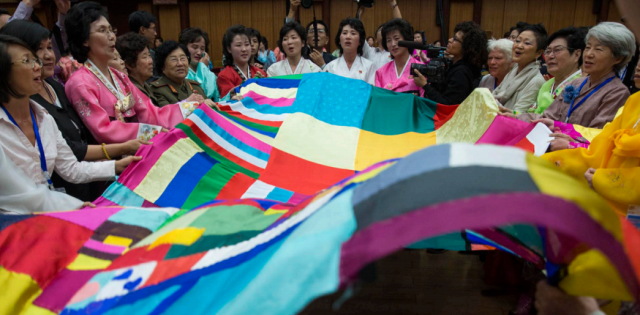When 20 foreign ministers meet to talk about Korea, women will join together to urge a peaceful solution, for everyone’s sake.

Foreign ministers from 20 nations are meeting in Vancouver on January 16 to discuss North Korea. I’ll be in the city too, joining 16 women representing peace movements, women's networks, and faith groups from around the globe. I’m very pleased that United Church global partner Rev. Moon-Sook Lee, vice-chair of the Reconciliation and Reunification Committee of the National Council of Churches of Korea and a minister of the Presbyterian Church in the Republic of Korea, will be there too.
That’s particularly appropriate, since the United Church has a long history of mission relationships in Korea, spanning well over 100 years. In 2015, the church entered into formal agreements of mutual recognition of ministries with The Presbyterian Church in the Republic of Korea, and several of their ministers now work in Canada.
The women’s delegation is gathering in Vancouver to encourage the politicians to include civil-society perspectives in their talks. We want foreign ministers to begin the process toward a diplomatic and peaceful solution for the Korean people.
Research shows that including women in peace processes not only makes reaching a peace agreement more likely, but it also yields more durable agreements. A major study spanning three decades of 40 peace processes, shows that of 182 signed peace accords, an agreement was reached in all but one case when women’s groups influenced the peace process. Our own Foreign Minister, Chrystia Freeland, has said, “The path to peace must include empowered women.”
Where peace processes include women, peace is more enduring and stable. Freeland has already been given a letter signed by 216 civil society organizations from 47 countries supporting the active and meaningful participation of the women peacemakers at the Vancouver meeting.
U.S. Secretary of State Rex Tillerson has stated that he wants the Vancouver meeting to explore ways to put additional pressure on North Korea, to force it to give up it nuclear missile program. While also condemning North Korea’s missile program, Freeland has said that “Canada believes that a diplomatic solution to the North Korea crisis is essential and possible.”
I’ll be one of five members of the delegation who will meet with Freeland the day before the ministers’ summit, at a Civil Society Roundtable, to more fully discuss that idea. We want to use every possible opportunity possible. This is a crucial test of the Canadian government’s recently announced feminist foreign policy. Let's not waste this chance for Canada to “step up” and give urgently needed global leadership for peace.
The women’s delegation wants to remind diplomats that across the globe, people favour a diplomatic approach to North Korea over a military one. We are encouraged by recent breakthroughs in inter-Korean rapprochement. North Korean officials are meeting for talks with South Korea, and there will be a North Korean delegation to the Winter Olympics, to be held just 80 kilometres from the North Korean border.
A peaceful solution to the Korean crisis is within reach. Let’s focus on that, and not on sanctions, which only deprive average North Koreans of the basic necessities they need to live.
- Get involved! Candlelight Vigil for Peace, Jan. 15; Witness for Peace, Jan. 16
- Learn more on the Women Cross DMZ website, including the Jan. 15 Statement of the Vancouver Women’s Forum on Peace and Security on the Korean Peninsula
- CBC News speaks to Patti Talbot about the multinational coalition of woman representing peace movements attending a meeting on North Korea (Jan. 14, 2018)
—Patti Talbot is Program Coordinator, People in Partnership, for The United Church of Canada. She leads the Global Partnership team, and has responsibility for partnerships in northeast Asia.